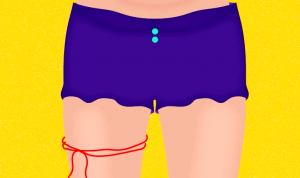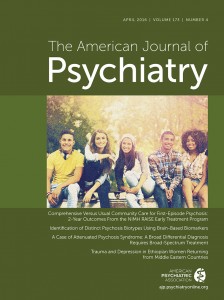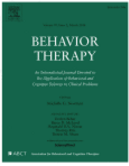The May edition of Spotlight: BDD News & Research Updates is here! This quarterly blog series brings you the latest research news and information concerning body dysmorphic disorder (BDD), from highlighting work by members of our Scientific & Clinical Advisory Board to the latest headlines in journals and popular media alike. This blog series is part of our larger Spotlight series, which contains monthly updates on OCD research & news, and quarterly features on hoarding disorder, pediatric OCD, and BDD.
Spotlight is also available via email so you can receive the latest research news and information directly in your inbox. Sign up to receive our June update, as well as all future issues, by going here and selecting the “Spotlight” option on our email signup form.
Making Headlines
BDD advocates and stories making news around the globe this spring
 “Modern Family” actor Reid Ewing on body image, mental health
“Modern Family” actor Reid Ewing on body image, mental health
CBS News, May 5, 2016
Actor Reid Ewing, perhaps best known for his portrayal of Dylan on ABC’s Modern Family, discusses a variety of mental health topics in a recent interview, including his struggles with body dysmorphic disorder.
 THIS Is What Living With Body Dysmorphic Disorder Is Really Like
THIS Is What Living With Body Dysmorphic Disorder Is Really Like
Refinery29, February 24, 2016
An article published on Refinery29 by recovery blogger Lindsey Hall introduces readers to her engaging personal story that covers some of struggles and challenges she’s faced related to BDD.
Body Dysmorphic Disorder in Men
Academy for Eating Disorders, April 2016
The Academy for Eating Disorders hosted a Twitter chat featuring Brian Cuban, author of Shattered Image: My Triumph Over Body Dysmorphic Disorder and brother of billionaire investor Mark Cuban. Their chat, summarized in the Storify article above, covered topics like who BDD affects, Cuban’s personal experiences with the disorder, and how to bring more male voices into conversations about BDD.
SCB Showcase
Members of the IOCDF Scientific & Clinical Advisory Board (SCB) are among the best clinicians and investigators in the United States who treat and/or conduct research in the field of OCD and related disorders, including BDD. Here, we recognize SCB members whose work has recently turned heads in the scientific community or general public.
 Pharmacotherapy Relapse Prevention in Body Dysmorphic Disorder: A Double-Blind, Placebo-Controlled Trial ($)
Pharmacotherapy Relapse Prevention in Body Dysmorphic Disorder: A Double-Blind, Placebo-Controlled Trial ($)
American Journal of Psychiatry, April 8, 2016
SCB Vice Chair Sabine Wilhelm and SCB members Katharine Phillips and Darin Dougherty are among the authors on this study, which they say is the first study examining relapse prevention and BDD. Study participants were given a drug called escitalopram (the generic drug name for Lexapro®), a serotonin reuptake inhibitor (SRI) commonly used to treat BDD, and then monitored to track the drug’s effectiveness in reducing symptoms and helping prevent a relapse over time. Results showed that escitalopram delayed time to relapse or prevented relapse entirely for a significant number of study participants, and that severity of BDD symptoms also significantly improved.
BDD Research Corner
A monthly roundup of the latest in BDD research from scientific journals and other publications
 The Body Dysmorphic Disorder Symptom Scale: Development and preliminary validation of a self-report scale of symptom specific dysfunction ($)
The Body Dysmorphic Disorder Symptom Scale: Development and preliminary validation of a self-report scale of symptom specific dysfunction ($)
Body Image, June 2016
This study introduces the Body Dysmorphic Disorder Symptom Scale (BDD-SS), a new self-report measurement tool that examines the severity of a wide variety of symptoms associated with BDD. The authors, who also developed this new scale, argue this fills a gap by addressing a broader range of symptoms than what is addressed by existing measures. The study found that the BDD-SS was a reliable tool after comparing its results with those from other BDD, body image, and depression scales. The authors’ findings indicate that the BDD-SS can be quickly administered and used for different research and clinical purposes.
 Prevalence of Body Dysmorphic Disorder and Muscle Dysmorphia Among Entry-Level Military Personnel ($)
Prevalence of Body Dysmorphic Disorder and Muscle Dysmorphia Among Entry-Level Military Personnel ($)
Military Medicine, May 2016
Authors of this study sought to determine the prevalence of BDD and muscle dysmorphia (MD) in enlisted U.S. military personnel, and then determine the relationship between supplement use with BDD and MD. Results showed what authors describe as “a higher than expected prevalence rate of BDD and MD in service members,” which they say indicates a need for increased awareness of both BDD and MD in mental health providers, primary care providers, and commanders, and justifies further military-specific BDD and MD research.
 Cognitive-Behavioral Therapy for Adolescent Body Dysmorphic Disorder: A Pilot Study ($)
Cognitive-Behavioral Therapy for Adolescent Body Dysmorphic Disorder: A Pilot Study ($)
Behavior Therapy, March 2016
Despite BDD’s severity and early age of onset (usually during adolescence), authors of this study argue treatment outcome research on adolescent BDD is scarce. This study, then, examined the use of cognitive behavior therapy (CBT), considered the gold standard in treating BDD in adults, and applied a new form of it to teens and young adults in what is currently the largest study of a psychosocial treatment for adolescent BDD. The authors found that BDD symptoms improved significantly post-treatment, and treatment gains were also maintained at a six-month follow-up.
IOCDF Research Resources
Find other research-related resources from the IOCDF, including:
- Join a research study as a participant
- Learn about the IOCDF Research Grant Program
- Donate to the IOCDF Research Grant Fund
For researchers:
- Recruit participants for an IRB-approved research study
- Attend the IOCDF Research Symposium at the 23rd Annual OCD Conference in Chicago


Leave a Reply